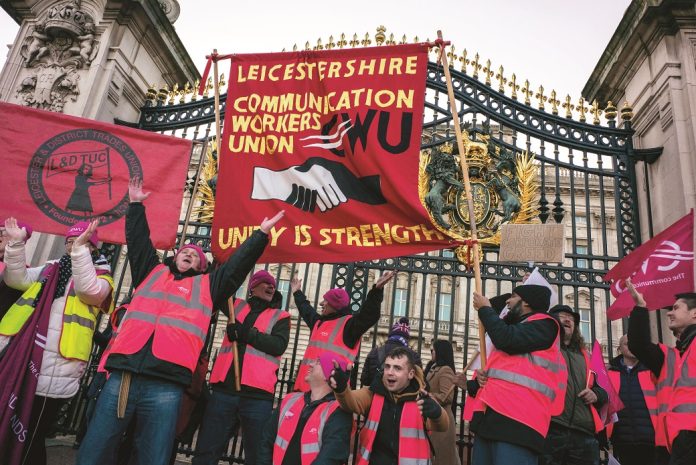
Socialist Party member in CWU
The first day of the Communication Workers Union (CWU) annual conference opened with a tribute to former president Jane Loftus and other members who sadly passed away last year.
This year’s CWU conference is the first since the major industrial disputes that the union faced in the three main companies in which it organises: Royal Mail, BT and the Post Office. These disputes were an intense battle that saw around 400 Royal Mail reps sacked or suspended – most are now reinstated.
In response to the union’s declining membership, the leadership put forward two phases of changes. The first phase focused on immediate spending reductions and the second phase a deeper transformation with the stated aim to make the union more effective so that it can grow.
To decide on this, the normal general conference has been scheduled for later in the year, and instead the first two days of this conference dealt with restructuring of the union, including rules revision.
Members accepted the need for some cost-cutting measures but were determined to make sure that lay member democracy was not weakened.
The NEC’s proposal to move from an annual general conference to one every two years was conclusively defeated, as branch delegates argued how vital a regular ‘workers’ parliament’ is. Socialist Party member Deji Olayinka, from the UTAW tech branch, highlighted that one reason people join and stay in the union is that, through conference, they know they can push the union to act on the social and political issues they care about.
Preserving the annual conference was an important victory, alongside ensuring that the number of regions isn’t reduced in a way that harms their ability to function.
Even though the majority of the National Executive Committee (NEC) policy proposals were accepted by conference, it wasn’t a sweeping endorsement by any measure, and there certainly wasn’t complete alignment between the NEC and branches.
The NEC opposed all 15 of the branch motions at the restructuring conference, but four were passed, with another being narrowly defeated on a card vote. Throughout, there was strong opposition against any steps to weaken lay democracy.
This shows both the potential and the need to build a fighting left within the CWU. Socialist Party members want to build that with other left activists. This grouping could better organise around demands raised by the rank and file.
At the official Palestine fringe meeting organised by the union, an organiser in the more autonomous UTAW branch explained how they were recruiting because the tech branch was organising workers to prevent their companies from supporting genocidal acts in Gaza. Postal members asked why their strength in the distribution system wasn’t being organised in the same way.
As we go to press, the industrial conferences have begun. This is an opportunity for members to review the industrial battles that have taken place and decide on the strategy needed to win the next fight.
Royal Mail – Nationalise!
Royal Mail management’s threat of possible administration undoubtedly was a major factor in the deal being agreed that settled the dispute.
In opening the postal industrial conference, new deputy general secretary (postal), Martin Walsh, said that no Tory or Labour government is going to nationalise Royal Mail. But this is the wrong lesson to draw from the dispute, especially with the talk of possible takeover by the ‘Czech sphinx’ Daniel Kretinsky.
It was a mistake of the CWU leadership, when administration was threatened during the dispute, not to demand of Keir Starmer that he committed to the nationalisation policy that was passed at Labour Party conference in 2022. That would have given the entire membership the confidence to fight for more.
Socialist Party members had warned that privatisation would leave Royal Mail open to takeover bids, and could put in danger the members’ pension funds. The CWU must demand that Starmer pledges now to bring Royal Mail back into public hands with compensation only to those with proven needs. This would kill talk of any takeover, and shows how vital it is for the union to push for a political voice alongside its industrial strategy.
With the right decisions, the CWU could stabilise and grow, but it needs to increase density in its recognised workplaces like BT and Royal Mail, while expanding into other companies in its sectors. This can be achieved through a militant industrial and political strategy that shows the benefits and power of the union.






